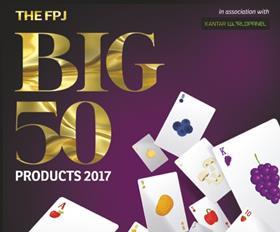
The FPJ Big 50 Products ranks the 50 best-selling fresh fruit and vegetable products by sales value, using Kantar Worldpanel data for the 52 w/e 21 May 2017.
11. Peppers
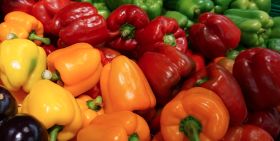
'Snacking and exports drive pepper opportunity'
Pepper sales have been fairly static from a sales point of view, with traffic-light packs now a well-established staple in many consumers’ baskets. Ramiro pointed peppers are seeing good growth, while the snack market is also on the rise driven by wider availability of Sweet Bite and similar smaller peppers across the retailers.
To grow the market, the industry could do with a concerted marketing push to remind consumers of the sweet taste of bell peppers, according to Lee Stiles at the Lea Valley Growers’ Association. Curiously for the 11th largest crop in the market, peppers don’t benefit from much in the way of industry promotion, whereas lower-ranking lines such as peas and asparagus do.
Nevertheless there are areas of growth. Lea Valley growers have produced their first commercial crop of chilli peppers this year, tapping into rising demand for food with added spice, and there are even plans to explore the possibility of exporting.
“We are looking at the exports markets and have been having discussions with the Department of Trade & Industry about that,” explains Stiles. “California has a similar outlook to London in terms of the healthy eating trend, so we could go there. You have to look at these opportunities with Brexit.”
12. Baking potatoes
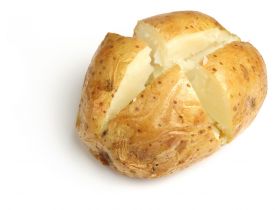
The winning potato formula?
Value: £254.9m (+9.3%) Volume: 272.4m kg (+12.9%)
Bucking the downward trend in the potato category generally, baking potatoes have had a stellar year as consumers buy into the convenience factor, as well as the huge variety of toppings that can be added from beans and tuna to cheese, chilli and much more.
The category is attracting new shoppers, according to Greenvale marketing director Leon Mundey, with penetration up 1.7 per cent and frequency of purchase rising four per cent over the year. “This is partly driven by lower average prices and the convenience of baking potatoes as a low-cost meal solution,” he says.
Rob Clayton, strategy director for potatoes at AHDB, adds that there has been growth across all age ranges, suggesting a strong future. “This could be because they are perceived as a healthy option which is easy to prepare – both key drivers across food in general,” he adds.
While these figures only cover retail, specialist baked potato outlets are popping up more and more frequently, and are particularly common in street food these days.
Classic names like Spudulike are testament to the enduring popularity of baked potatoes, and with new ready-to-eat formats like chilled and frozen products appearing at retail, there’s no reason why the current sales trajectory cannot continue.
13. Raspberries
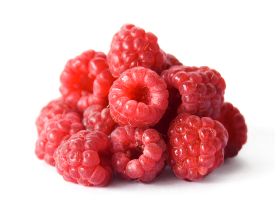
Raspberries bursting with potential
Raspberries have been one of the stars of the soft-fruit category over the past year, with an increase in penetration and frequency of purchase driving double-digit sales growth.
A consumer shift towards healthier snacking has led to more frequent consumption and the number of usage occasions continues to expand with the summer fruit used increasingly in smoothies, juices, baked goods and as a cereal or yoghurt topper.
BerryWorld handed out raspberries instead of strawberries at Wimbledon this year, reflecting the fruit’s growing popularity. Along with blueberries, managing director Paul Cole earmarks the product as the soft fruit with the biggest growth potential in the coming year. He may not see the product achieving the same heights as strawberries, which account for 42 per cent of soft-fruit sales, but there is still lots of headroom for expansion, he believes.
The British season this year has been particularly high yielding, with the warm weather causing a glut of fruit at Berry Gardens. Tesco responded by buying an extra 40 tonnes of Driscoll’s Maravilla from the supplier, dropping the price of its larger 425g boxes to £3. Meanwhile, Scottish grower Blacketyside Farm has invested in new tray sealing equipment to keep pace with a 25 per cent increase in orders for berries.
14. Carrots
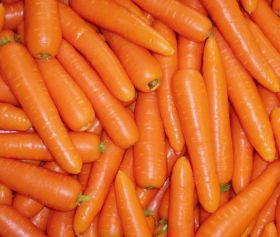
Carrot prices continue to fall
Carrot pricing is still the biggest concern for those in the business as the average selling price drops ever lower thanks to retail competition. While lower prices have driven volume growth of almost four per cent, suppliers are warning that deflation is weakening the carrot supply base.
“My concern is when is this race to the bottom on price going to finish,” says Guy Poskitt, managing director of MH Poskitt. “Price is a massive problem; seed price has gone up because of currency; labour has gone up; agrochemical inputs have gone up. It’s not a pretty picture.” On the other hand, Poskitt says promotions have helped drive volume growth, especially over Christmas, but he warns that they also encourage shoppers to buy more than they need.
Category manager at Produce World, Mark Cheadle, believes lower prices are not helping to grow the carrot category, with volume sales coming from population growth and increased purchases by existing customers. “Carrots is currently at 86 per cent penetration, so there is still an opportunity for that remaining 14 per cent of households to buy them. I think this will come from new usage occasions such as getting carrots into some of the emerging cuisines,” he says.
15. Pears
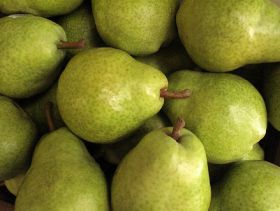
Pears ripe and ready for growth
The ripe and ready format has revolutionised a product that can be at risk of disappointing consumers, bringing more repeat purchase and improving its reputation.
UK growers are starting to get on board, with AC Goatham & Son investing significantly in its pear orchards in recent years as it commits to the future for the crop. “Our experience is that individual varieties are performing differently,” says commercial director Carol Ford. “For example, last year we introduced into our business British ripe and ready Conference pears, which have been very popular among our customer base.”
The sector received a further boost last autumn when Tesco added the fruit to its Perfectly Imperfect line, as well as launching a new Rosedene Farms pears range. The move saw the supermarket chain buying up a further 200 tonnes of smaller or misshapen pears for the two ranges.
And with the promise of red or blush pears, which have gained traction abroad, finding favour in the UK, there is clear potential for further growth in the category.



